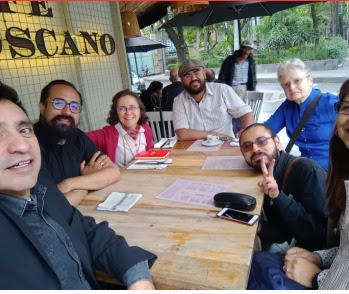Quizá has escuchado o leído sobre las las siete metas de la Laudato Si, aquí un pequeño resumen de lo que significa.
- La Respuesta al Clamor de los Pobres es una llamada a promover la eco-justicia, conscientes de que estamos llamadas a proteger todas las formas de vida en la Tierra. Las acciones podrían incluir el apoyo a iniciativas para acabar con la trata de personas, el acompañamiento a personas mayores, personas viviendo con discapacidades, migrantes y familias de desaparecidos, la asistencia a la niñez en guarderías cuyas madres con bajos ingresos tienen que trabajar, etc.
- La Respuesta al Clamor de la Tierra es una llamada a proteger nuestra casa común para el bienestar de todo el planeta. Las acciones podrían incluir la promoción de un mayor uso de energías renovables limpias y la reducción de combustibles fósiles para lograr la neutralidad de carbono, los esfuerzos para proteger y promover la biodiversidad, el apoyo a políticas que garanticen el acceso al agua potable, etc.
- La Adopción de Estilos de Vida Sostenibles se fundamenta en la idea de la solidaridad y el fomento de la sobriedad en el uso de los recursos y la energía. Las acciones podrían incluir la participación en proyectos ecológicos urbanos, el fomento de la eliminación del plástico de un solo uso, la adopción de una dieta más basada en vegetales, el apoyo a personas que deseen implementar huertos familiares/comunitarios, etc.
- La Economía Ecológica reconoce que la economía es un subsistema de la sociedad humana. Las acciones podrían incluir la promoción de cooperativas en comunidades indígenas, la producción sostenible, el comercio justo, el consumo ético, las inversiones éticas, la desinversión en combustibles fósiles y en cualquier actividad económica perjudicial para el planeta y las personas, la inversión en energías renovables, etc.
- La Educación Ecológica consiste en repensar para fomentar la conciencia ecológica y la acción transformadora. Las acciones podrían incluir la asistencia a pacientes con medicina alternativa, la promoción de valores del cuidado de la Creación, el soporte a proyectos educativos con enfoque ecológico, etc.
- La Espiritualidad Ecológica surge de una profunda conversión ecológica y nos ayuda a "descubrir a Dios en todas las cosas". Las acciones podrían incluir oraciones sobre ecología integral, promoción de celebraciones litúrgicas basadas en el cuidado, desarrollo de retiros, catequesis y programas de formación ecológicos, etc.
- El Empoderamiento y la Resiliencia de la Comunidad prevén un camino sinodal de compromiso comunitario y acción participativa a varios niveles. Las acciones podrían incluir la promoción de la incidencia y la concienciación sobre la fracturación hidráulica (fracking), el fomento del arraigo en el territorio local y los ecosistemas vecinales, posturas públicas contra los sistemas injustos, etc.

.jpg)





